Using the most recent returns and fund update reports from March 2023, we will examine Westpac’s recent KiwiSaver Performance.
Westpac KiwiSaver scheme is one of the biggest banks in New Zealand and one of the four most prominent financial organisations in Australia. BT Assets Management Limited (BTNZ), which has more than $15 billion in funds under management, manages the Westpac investment funds, including the Active Series and Westpac KiwiSaver Scheme.
Table of Contents
News about Westpac
Performance of Westpac KiwiSaver Funds
Westpac Cash Fund
Westpac Default Conservative Fund
Westpac Conservative Fund
Westpac Moderate Fund
Westpac Default Balanced Fund
Westpac Balanced Fund
Westpac Growth Fund
News about Westpac
Westpac New Zealand reported a 33% decrease in net profit for the six months ending March 31 compared to last year. However, the underlying performance remained stable. Westpac NZ supported customers’ home ownership, business growth, and savings goals during this period. They provided significant assistance to customers affected by Cyclone Gabrielle and flooding. The bank has seen an increase in New Zealanders choosing to become Westpac customers. Mortgage lending grew by 5%, business lending by 4%, and deposits by 2%. Westpac is stable and well-capitalised, well-equipped to support its customers.
Performance of Westpac KiwiSaver Funds
|
3 Month |
1 Year |
3 Year |
5 Year |
Since Inception |
|
|
Cash |
1.13% |
3.14% |
1.55% |
1.69% |
2.70% |
|
Defensive Conservative |
2.77% |
-0.99% |
1.79% |
2.31% |
3.54% |
|
Conservative |
2.88% |
-1.66% |
2% |
2.32% |
4.18% |
|
Moderate |
3.54% |
-2.24% |
3.53% |
3.08% |
4.44% |
|
Default Balanced |
4.02% |
-2.44% |
NA |
NA |
-4.10% |
|
Balanced |
4.25% |
-3.13% |
5.64% |
4.07% |
5.28% |
|
Growth |
4.90% |
-3.93% |
7.59% |
4.91% |
5.78% |
Sourced from Westpac Fund Performance Report.
* These returns are to the 31st of March before tax and after fund management fees. Past performance does not necessarily indicate future performance and return periods may differ.
Note: The following information is sourced from Westpac Quarterly Fund updates published on the 3rd of May.
Westpac Cash Fund
After the basic fund fee but before taxes, this Cash Fund aims to target a return higher than the New Zealand Official Cash Rate. It invests mainly in term deposits, short-term debt securities, and cash in New Zealand. Westpac KiwiSaver Cash Fund has a return over the past three months of 1.13% and a return over the past year of 3.14%, more than the since inception return of 2.70%.
*The following is Sourced from Westpac Cash Fund Update
Returns

Fees
The total annual fees for investors in the Westpac Cash Fund are 0.27% yearly.
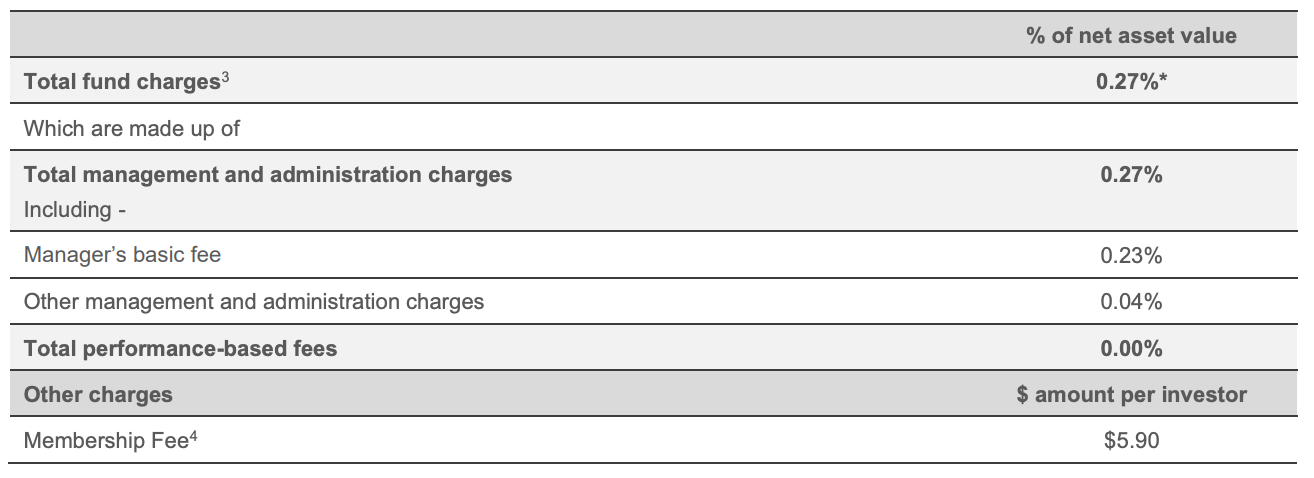
Investment mix
The investment mix is 100% cash and cash equivalents due to being a Cash Fund.
Top ten investments
This table shows Westpac’s top 10 investments in the Cash KiwiSaver Fund, which comprise 9.72% of the fund.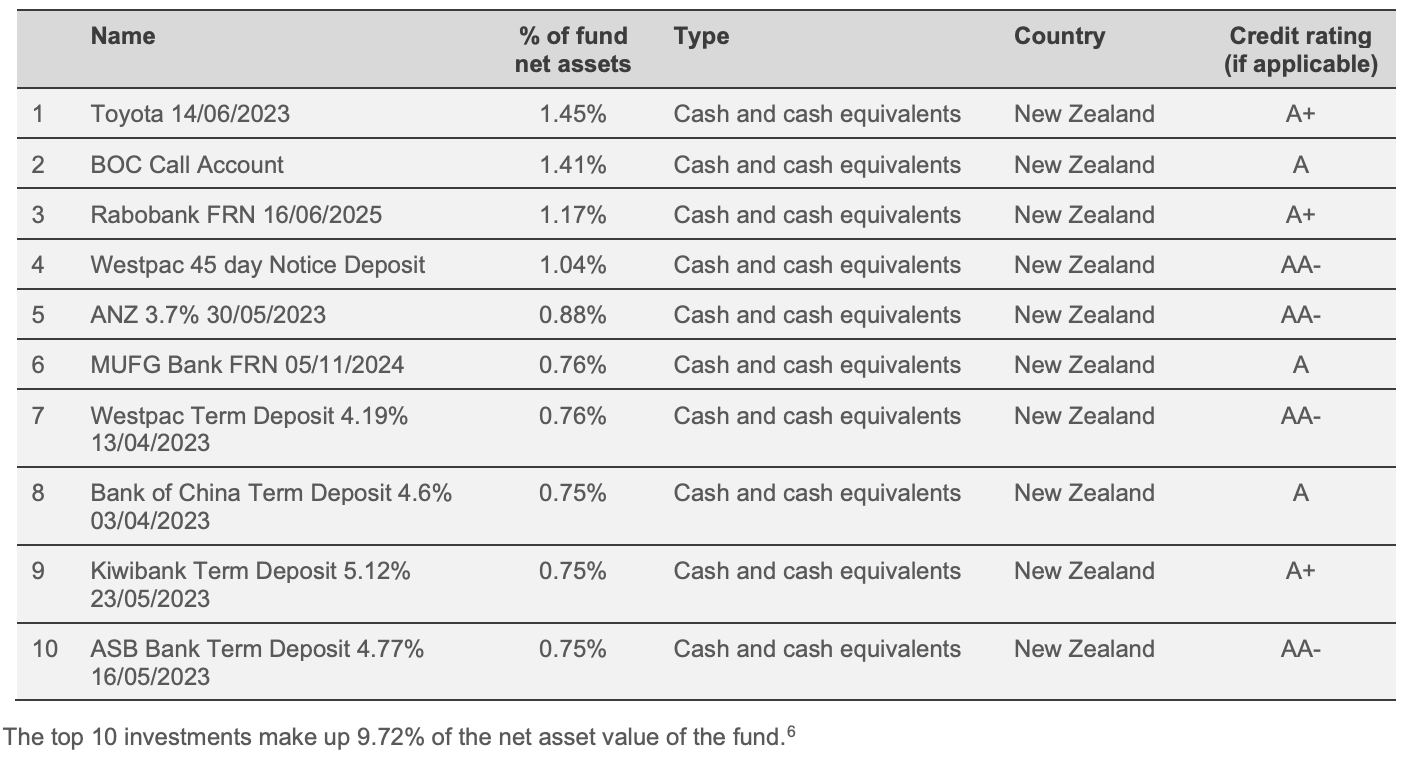
Westpac Defensive Conservative Fund
The Defensive Conservative Fund aims to provide stable returns over the short to medium term. The fund invests primarily in income assets but has a 20% benchmark allocation to growth assets. Volatility is expected to be higher than the Cash Fund but lower than the Conservative Fund in the Westpac KiwiSaver Scheme. Westpac Defensive Conservative Fund has a three-month return of 4.02% and a one-year return of -2.44%, less than the return since inception of -4.10%.
*The following is Sourced from Westpac Defensive Conservative Fund Update
Returns

Fees
The total annual fees for investors in the Westpac Defensive Conservative Fund are 0.39% annually.
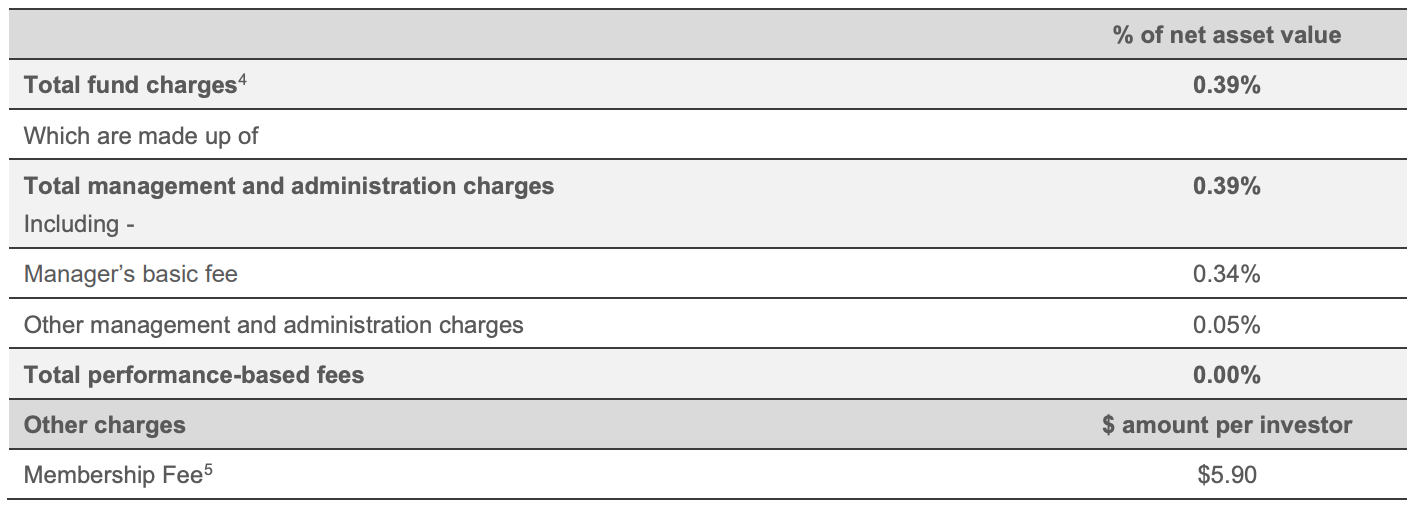
Investment mix
The investment mix shows the type of assets that the fund invests in.
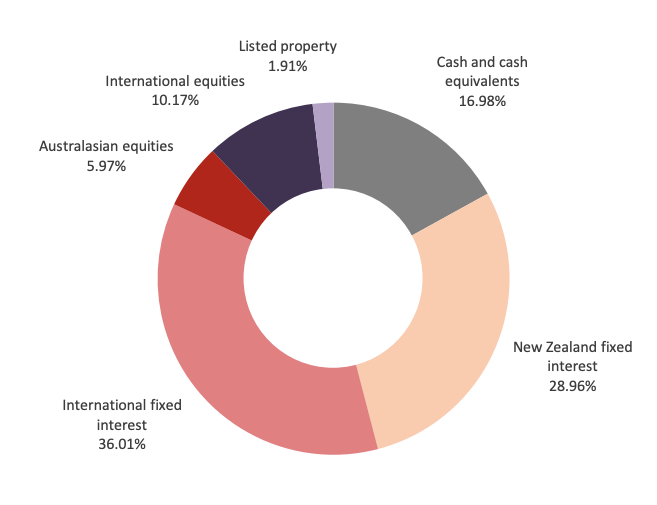
Top ten investments
This table shows Westpac’s top 10 investments in the Defensive Conservative KiwiSaver Fund, which comprise 6.96% of the fund.
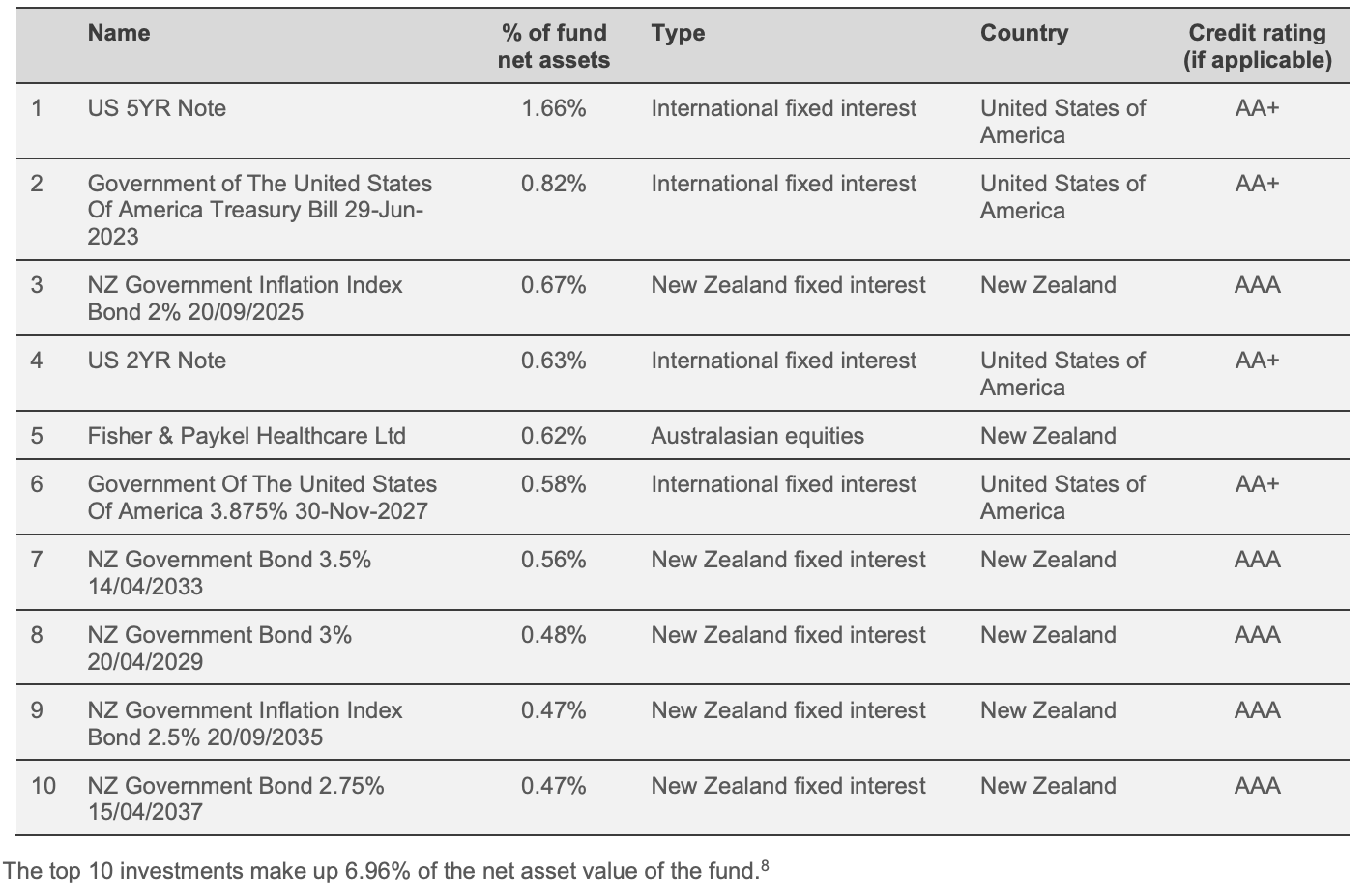
Westpac Conservative Fund
The Conservative Fund aims to provide stable returns over the short to medium term. The fund invests primarily in income assets but has a 25% benchmark allocation to growth assets. Volatility is expected to be higher than the Defensive Conservative Fund but lower than the Moderate Fund in the Westpac KiwiSaver Scheme. As opposed to the return since inception of 4.18%, the Westpac KiwiSaver Conservative Fund has a return over the past three months of 2.88% and a return over the past year of -1.66%.
*The following is Sourced from Westpac Conservative Fund Update
Returns

Fees
The total annual fees for investors in the Westpac Conservative Fund are 0.48%.
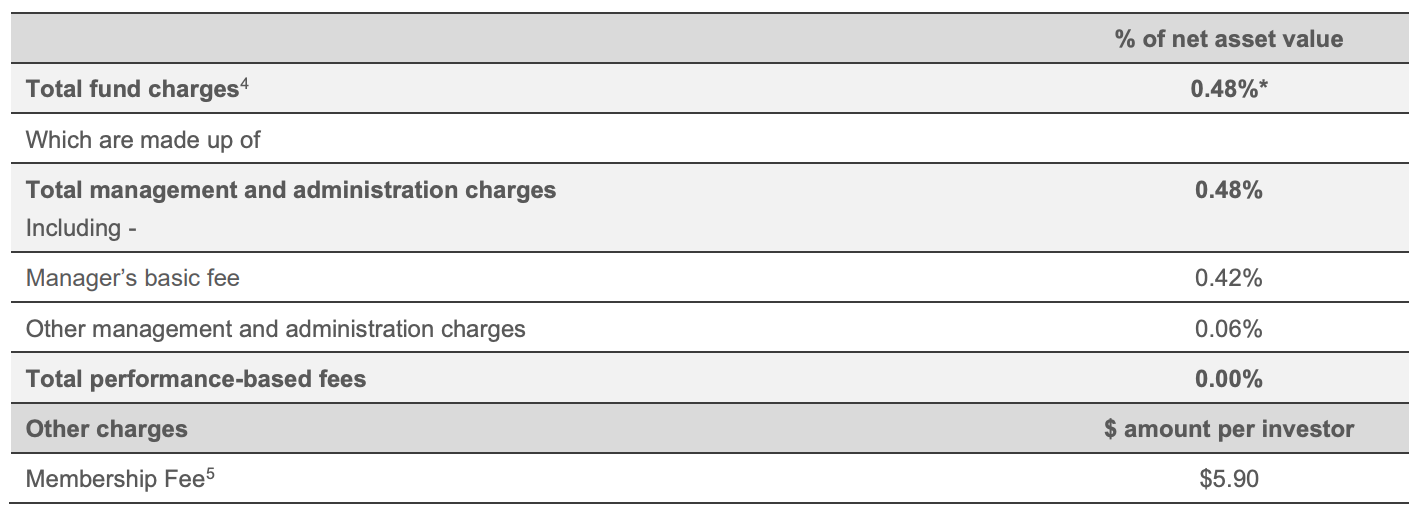
Investment mix
The investment mix shows the type of assets that the fund invests in.
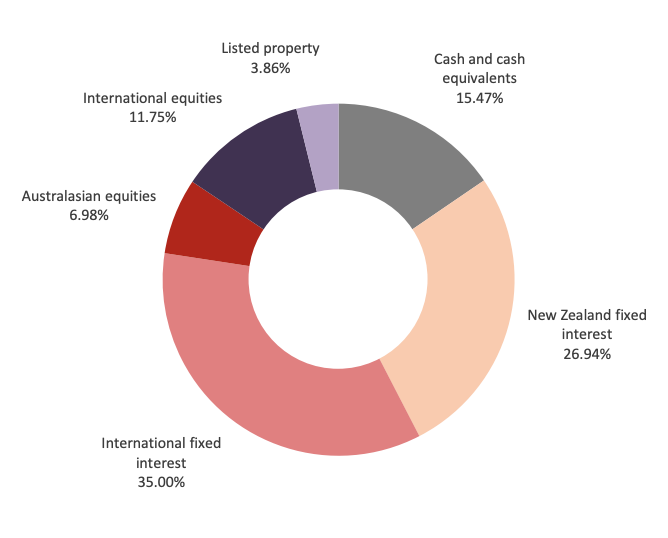
Top ten investments
This table shows Westpac’s top 10 investments in the Conservative KiwiSaver Fund, which comprise 6.87% of the fund.

Westpac Moderate Fund
Over the medium term, the Moderate Fund seeks to offer moderate returns. Compared to growth assets, the fund has a higher allocation to income assets. In the Moderate Fund, volatility is anticipated to be higher than in the Conservative Fund but lower than in the Default Balanced Fund. Westpac Moderate Fund has a three-month return of 3.54% and a one-year return of -2.24%, less than the return since inception of 4.44%.
*The following is Sourced from Westpac Moderate Fund Update
Returns

Fees
The total annual fees for investors in the Westpac Moderate Fund are 0.51% annually.
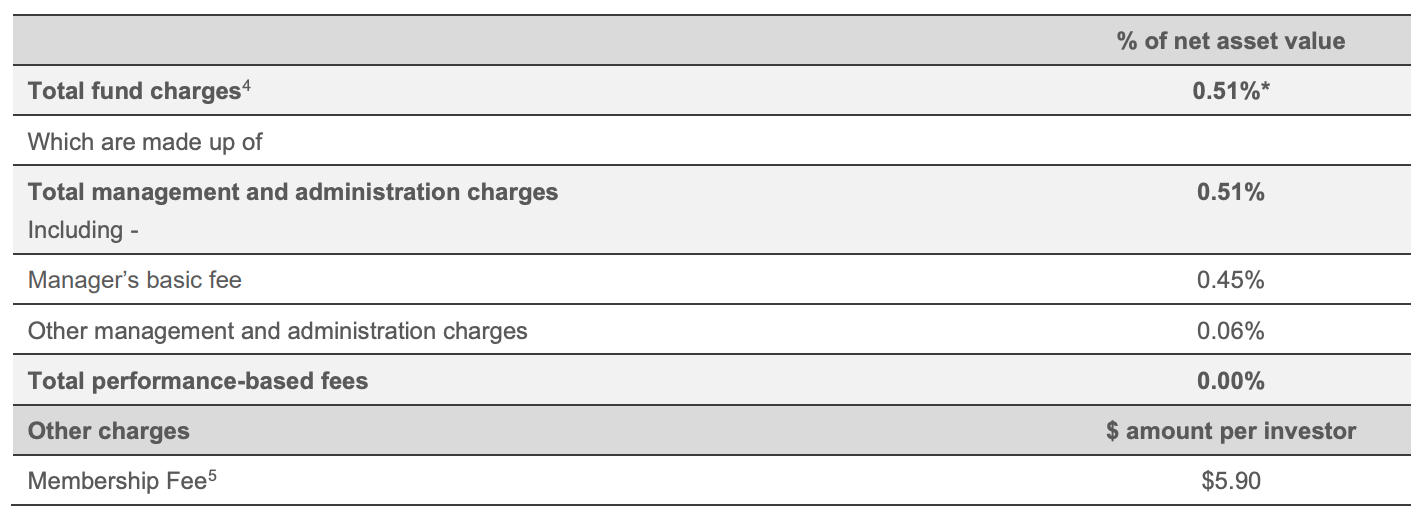
Investment mix
The investment mix shows the type of assets that the fund invests in.
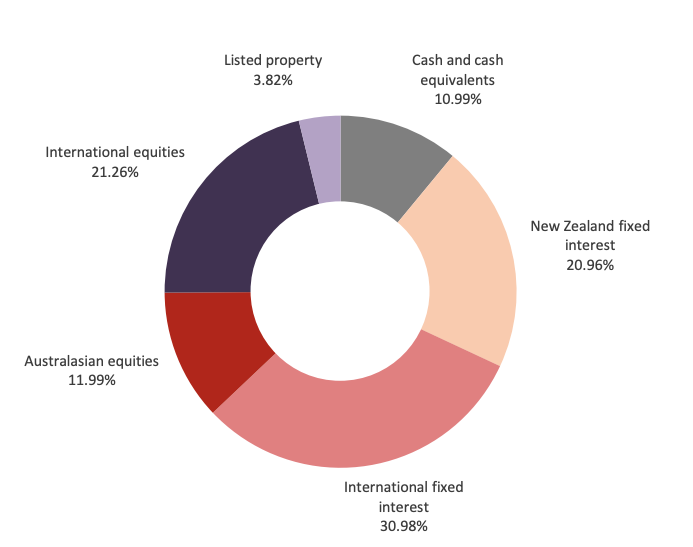
Top ten investments
This table shows Westpac’s top 10 investments in the Moderate KiwiSaver Fund, which comprise 8.27% of the fund.
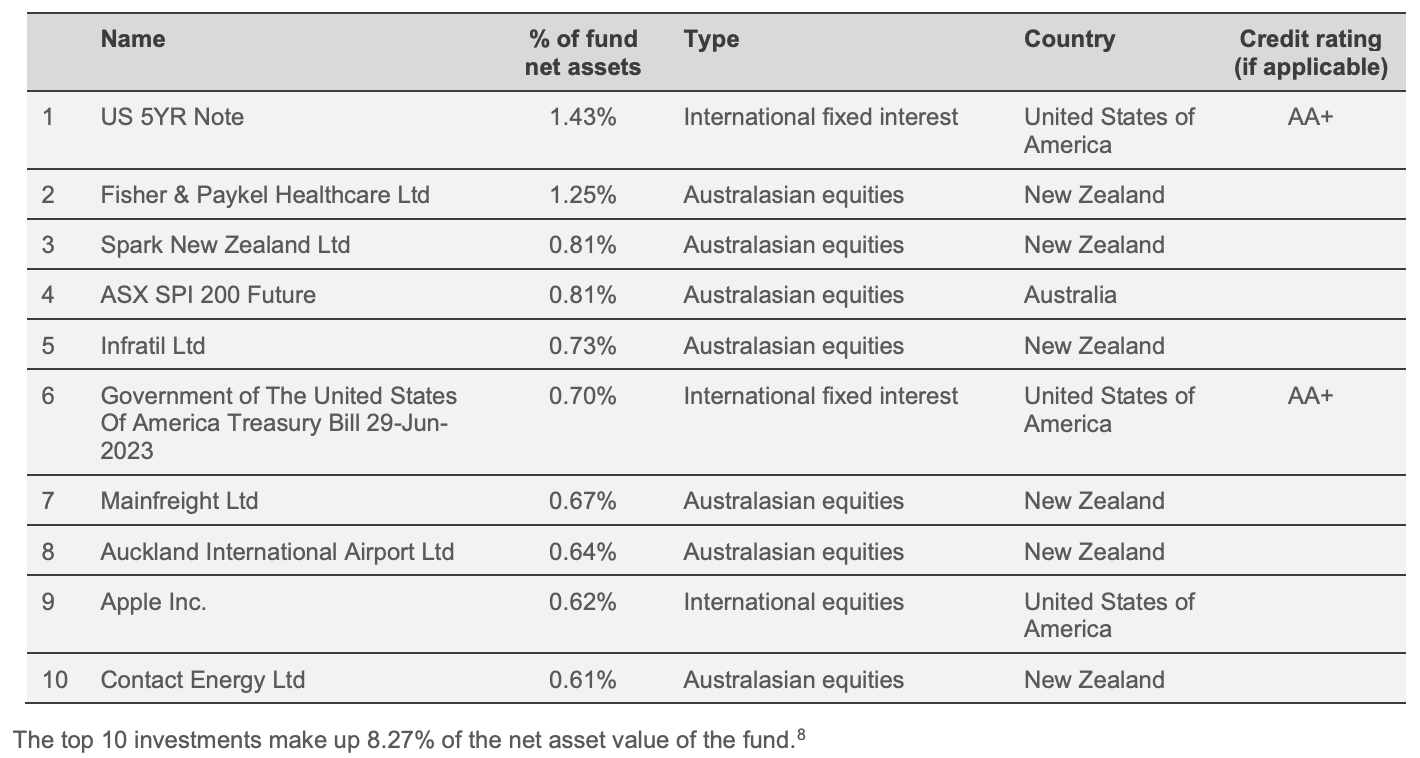
Westpac Default Balanced Fund
Over the medium to long term, the Default Balanced Fund seeks to offer moderate to medium returns. The fund’s benchmark allocation to growth and income assets is equal. In the Westpac KiwiSaver Scheme, volatility is anticipated to be higher than the Moderate Fund but lower than the Balanced Fund. Default Balanced Fund had a three-month return of 4.02% and a one-year return of -2.44%.
*The following is Sourced from Westpac Default Balanced Fund Update
Returns

Fees
The total annual fees for investors in the Westpac Default Balanced Fund are 0.40% annually.
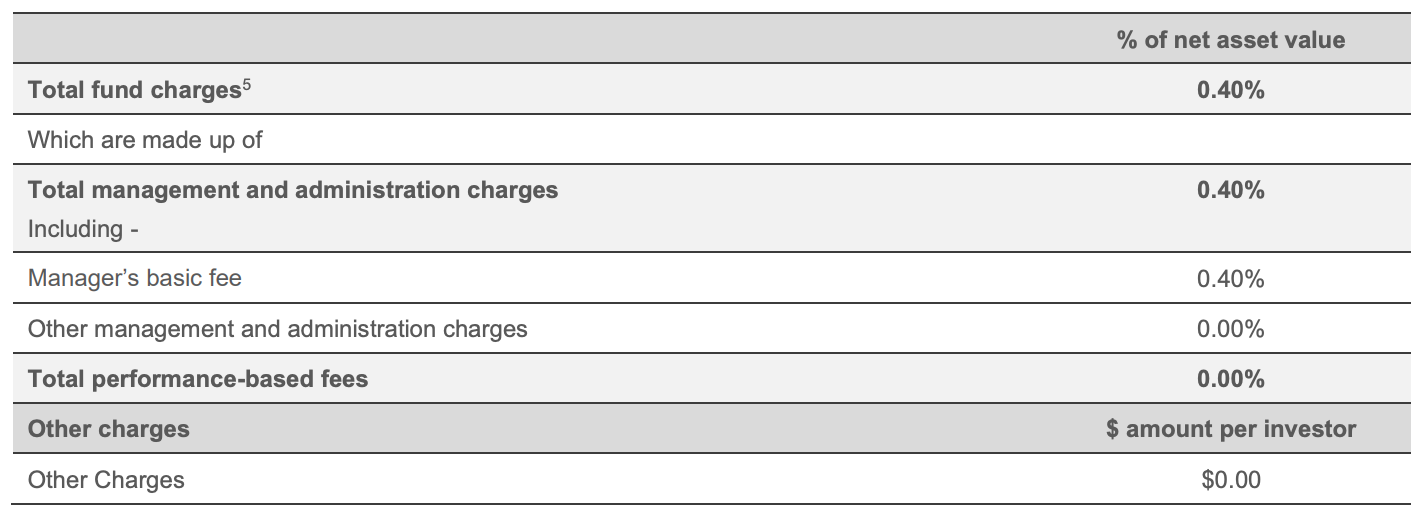
Investment mix
The investment mix shows the type of assets that the fund invests in.

Top ten investments
This table shows Westpac’s top 10 Default Balanced KiwiSaver Fund investments comprise 9.82% of the fund.
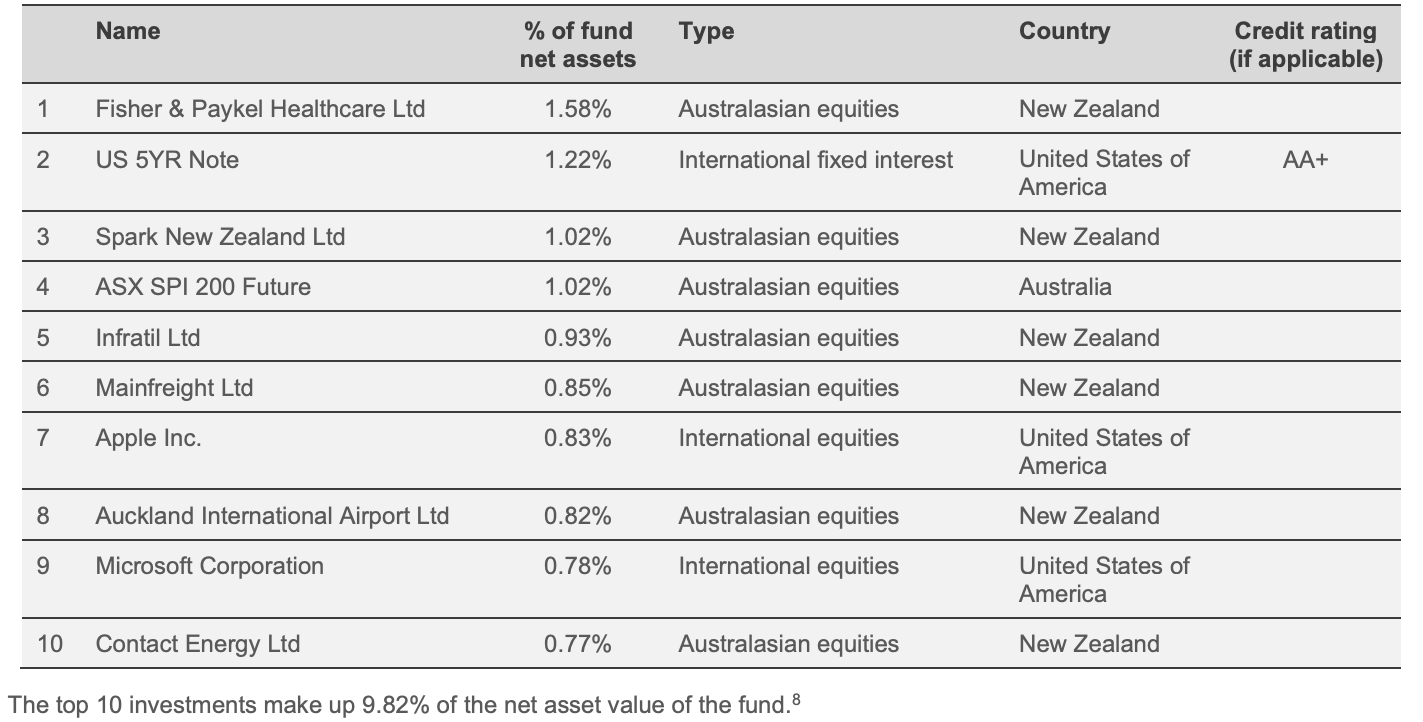
Westpac Balanced Fund
The Balanced Fund seeks to offer medium returns in the medium to long term. Growth assets comprise more of the fund’s benchmark allocation than income assets. In the Westpac KiwiSaver Scheme, volatility is anticipated to be higher than the Default Balanced Fund but lower than the Growth Fund. The balanced fund had a three-month return of 4.25% and a one-year return of -3.13%, less than the since inception return of 5.28%.
*The following is Sourced from Westpac Balanced Fund Update
Returns

Fees
The total annual fees for investors in the Westpac Balanced Fund are 0.59% annually.
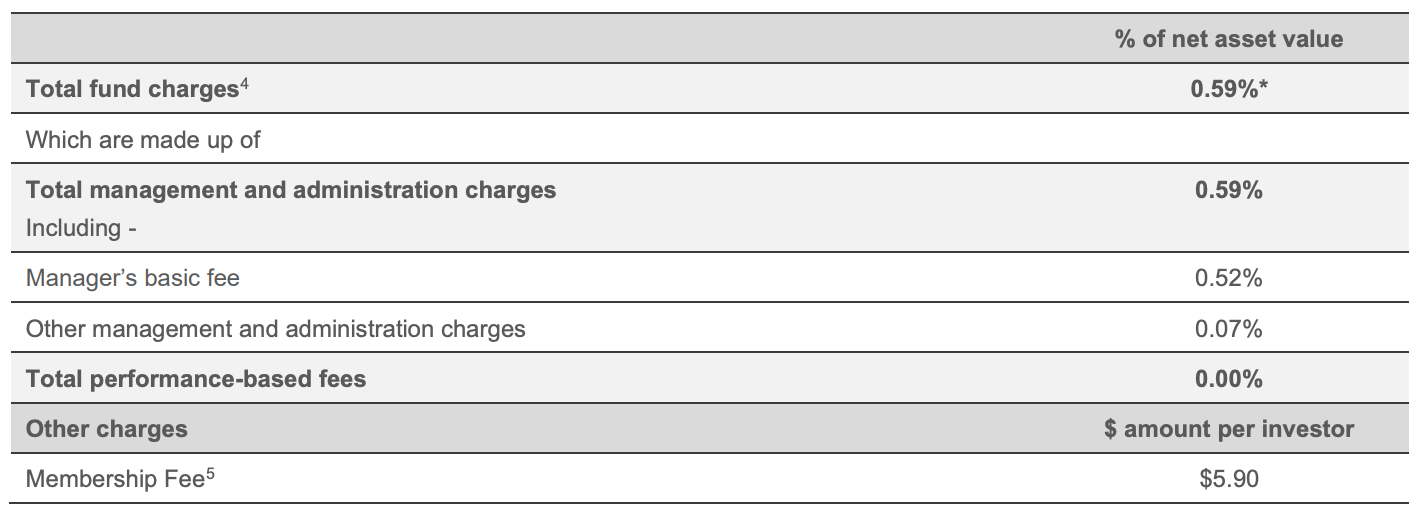
Investment mix
The investment mix shows the type of assets that the fund invests in.
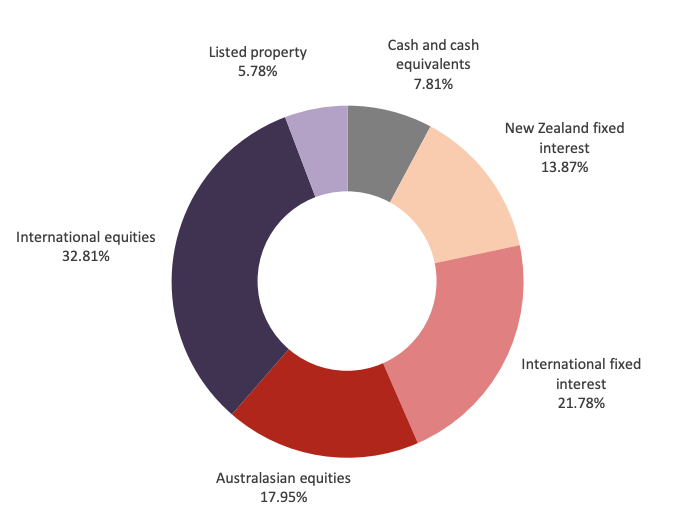
Top ten investments
This table shows Westpac’s top 10 investments in the Balanced KiwiSaver Fund, which comprise 11.12% of the fund.
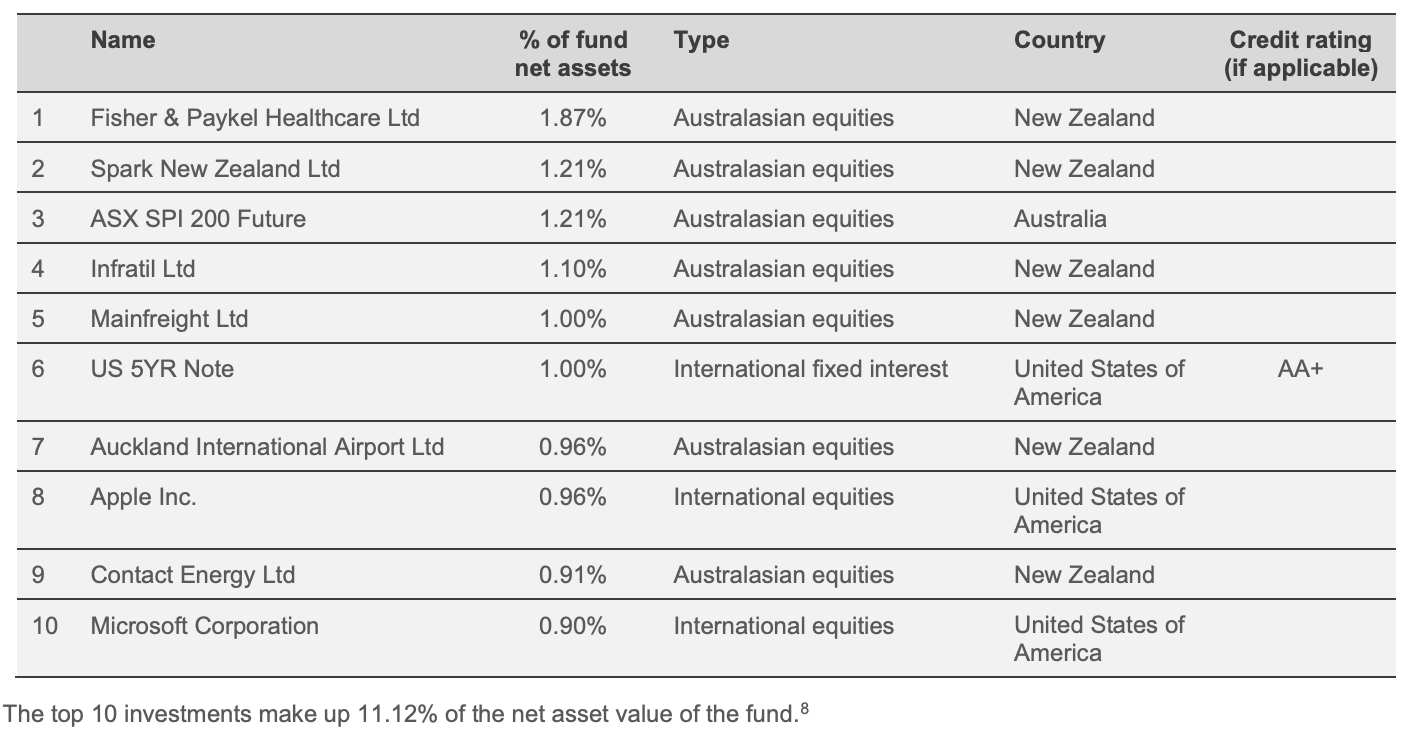
Westpac Growth Fund
Long-term increased returns are the goal of the Growth Fund. Although the fund has a portion allocated to income assets, it mostly invests in growth assets. Volatility is anticipated to be the highest of the funds in the Westpac KiwiSaver Scheme. Growth Fund’s three-month return is 4.90%, and the one-year return is -3.93%, lower than the return since inception of 5.78%.
*The following is Sourced from Westpac Growth Fund Update
Returns

Fees
The total annual fees for investors in the Westpac Growth Fund are 0.64% per year.
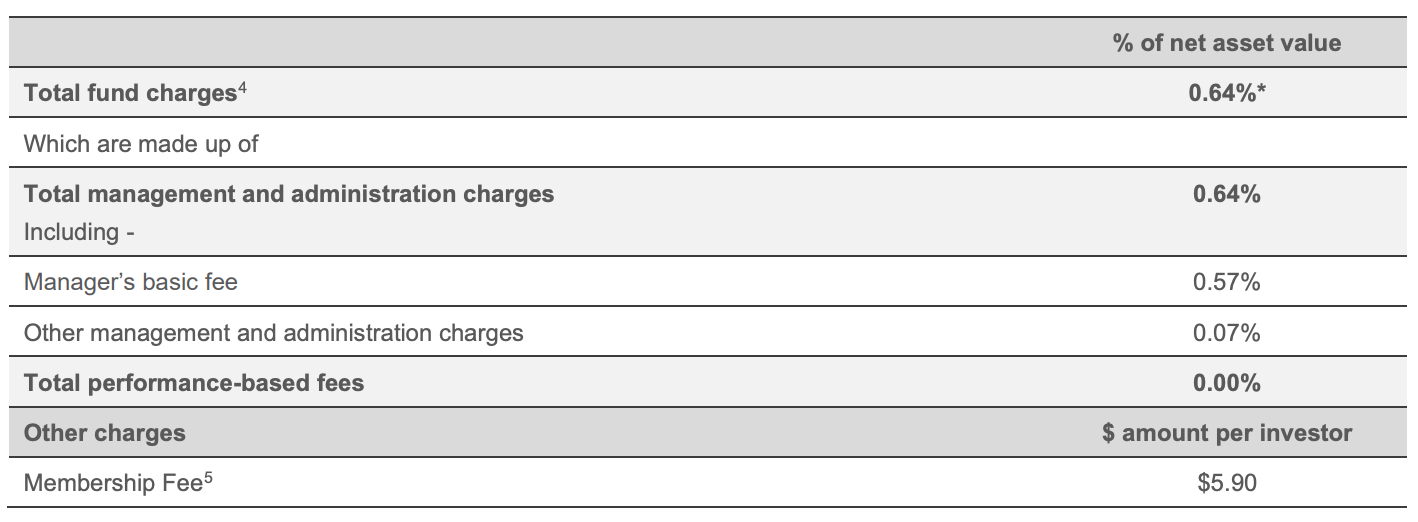
Investment mix
The investment mix shows the type of assets that the fund invests in.

Top ten investments
This table shows Westpac’s top 10 investments in the Growth KiwiSaver Fund, which comprise 15.11% of the fund.
Data for Westpac KiwiSaver funds have been sourced from Westpac KiwiSaver Funds. Past performance does not necessarily indicate future performance and return periods may differ.
To see if Westpac has the appropriate fund that aligns with your values, retirement goals, and situation, complete National Capital’s KiwiSaver Healthcheck.
